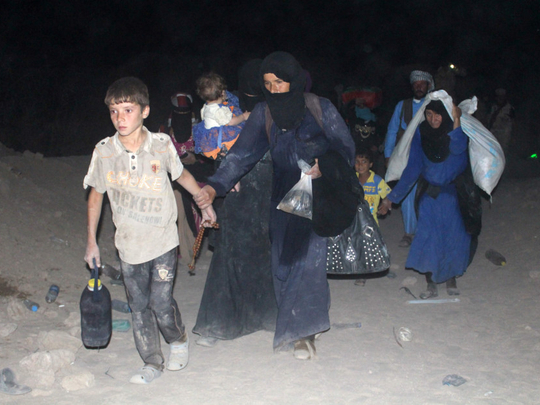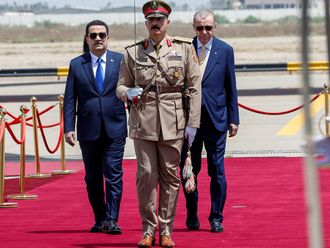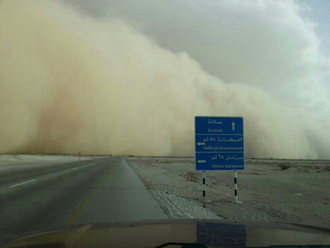
Arbil: Iraqi troops advanced against Daesh south of Mosul on Sunday as the US-led coalition intensifies its campaign against the militants on multiple fronts across their self-proclaimed caliphate.
Officers involved in the operation said Iraqi forces had moved towards the village of Haj Ali in tanks and armoured vehicles under cover of coalition airstrikes and artillery fire, capturing another village on the way.
“In the beginning they resisted but when they saw the force they withdrew,” said an Iraqi officer speaking from the newly recaptured village of Kharaib Jabr, adjacent to Haj Ali.
Haj Ali sits on the eastern bank of the Tigris river, opposite the Daesh hub of Qayara, where there is an airfield that is set to serve as a staging ground for future operations to recapture Mosul, about 60km north.
Daesh overran Mosul two years ago and went on to proclaim a caliphate straddling Iraq and Syria but has come under increasing pressure in recent months, losing ground to an array of forces.
Iraqi troops were deployed to the northern Makhmour area earlier this year and launched an operation in March touting it as the beginning of a bigger campaign to retake Mosul — the largest city under militant control.
Since then, Iraqi forces have made modest gains, capturing a handful of villages on the eastern bank of the river Tigris.
The commander of the operation blamed the slow pace on a lack of tanks and said he did not have enough men to hold ground after it was retaken from the militants.
Last week, Iraq deployed an armoured division along with boats and bridges to cross the river to Qayara, control of which would also isolate Mosul from territory the militants control further south and east.
Iraqi forces are also advancing on the edge of the Daesh bastion of Fallujah further south.
Civilians who have managed to escape Fallujah tell grim stories of life under the terrorist group. They said they had survived on stale dates and the militants were using food to enlist fighters whose relatives were going hungry.
The terrorists have kept a close guard on food storage in the besieged city near Baghdad that they captured in January 2014.
The militants visited families regularly after food ran short with offers of supplies for those who enlisted, said 23-year-old Hanaa Mahdi Fayadh from Sijir on the northeastern outskirts of Fallujah.
“They told our neighbour they would give him a sack of flour if his son joined them; he refused and, when they had gone, he fled with his family,” she said.
“We left because there was no food or wood to make fires, besides, the shelling was very close to our house.”
She and others interviewed in a school transformed into a refugee centre in Garma, a town under government control east of Fallujah, said they had no money to buy food from the group.
The Iraqi government stopped paying the salaries of employees there and in other cities under Daesh control a year ago to stop the group seizing the funds.
Fayadh escaped Sijir on May 27, four days after the government offensive on Fallujah began, with a group of 15 relatives and neighbours, walking through farmland brandishing white flags.
Most of the 1,500 displaced people who found refuge in the school in Garma were women and children, because the army takes men for screening over possible ties with Daesh. Fayadh said she was waiting for news of her two brothers who were being investigated.
Fayadh said the situation in the city was very difficult.
“The only thing remaining in the few shops open was dates, old, stale dates and even those were very expensive,” she said.
Azhar Nazar Hadi, 45, said the militants had asked her family to move from Sijir into Fallujah itself, a clear attempt to use them as human shields.
“We hid,” she said. “There was shooting, mortars and clashes, we stayed hidden until the forces came in” and escorted them out to the refugee centre.
The militants took hundreds of people, along with their cattle, with them into Fallujah, Hadi said.
“Life was difficult, very hard, especially when we stopped receiving salaries and retirement pensions.
“The last seven months we ran out of everything and had to survive on dates, and water,” she said. “Flour, rice and cooking oil were no longer available at an affordable price.” A 50kg sack of flour cost 500,000 dinars (Dh1,573.68), almost half an average Iraqi employee’s monthly salary.
Between 500 and 700 militants are in Fallujah, according to a US military estimate. The Iranian-backed Shiite militia coalition that is supporting the Iraqi army offensive on the city says the number of Daesh fighters there is closer to 2,500.
The United Nations says about 50,000 civilians remain trapped in Fallujah, which has been under siege since December, when the Iraqi army recaptured Ramadi, the capital of Anbar province to the west.












